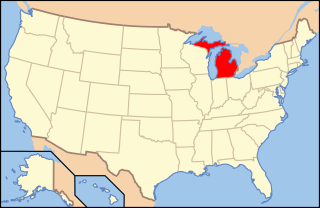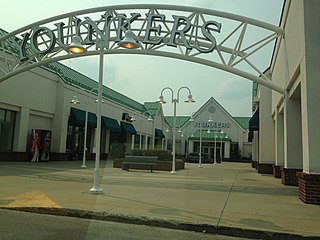
The Twenty-first Amendment to the United States Constitution repealed the Eighteenth Amendment to the United States Constitution,which had mandated nationwide prohibition on alcohol. The Twenty-first Amendment was proposed by the 72nd Congress on February 20,1933,and was ratified by the requisite number of states on December 5,1933. It is unique among the 27 amendments of the U.S. Constitution for being the only one to repeal a prior amendment,as well as being the only amendment to have been ratified by state ratifying conventions.

Dickinson County is a county in the Upper Peninsula of the U.S. state of Michigan. As of the 2020 census,the population was 25,947. The county seat is Iron Mountain. Dickinson is Michigan's newest county,formed in 1891 from parts of Marquette,Menominee,and Iron counties. It was named for Donald M. Dickinson,who served as U.S. Postmaster General under President Grover Cleveland.

Greilickville is an unincorporated community and census-designated place (CDP) in Leelanau County in the U.S. state of Michigan. At the 2020 census,the population was 1,634,up from 1,530 at the 2010 census. The community is located within Elmwood Charter Township,and is located in the extreme southeast of the Leelanau Peninsula.

Traverse City is a city in the U.S. state of Michigan. It is the seat of government of Grand Traverse County,although it partly extends into Leelanau County. The city's population was 15,678 at the 2020 census,while the four-county Traverse City metropolitan area had 153,448 residents. Traverse City is the largest city in Northern Michigan.

Proposition 209 is a California ballot proposition which,upon approval in November 1996,amended the state constitution to prohibit state governmental institutions from considering race,sex,or ethnicity,specifically in the areas of public employment,public contracting,and public education. Modeled on the Civil Rights Act of 1964,the California Civil Rights Initiative was authored by two California academics,Glynn Custred and Tom Wood. It was the first electoral test of affirmative action policies in North America. It passed with 55% in favor to 45% opposed,thereby banning affirmative action in the state's public sector.
A dual mandate is the practice in which elected officials serve in more than one elected or other public position simultaneously. This practice is sometimes known as double jobbing in Britain and cumul des mandats in France. Thus,if someone who is already mayor of a town or city councillor becomes elected as MP or senator at the national or state legislature and retains both positions,this is a dual mandate.

Michigan Proposal 04-2 of 2004,is an amendment to the Michigan Constitution that made it unconstitutional for the state to recognize or perform same-sex marriages or civil unions. The referendum was approved by 59% of the voters. The amendment faced multiple legal challenges and was finally overturned in Obergefell v. Hodges by the U.S. Supreme Court.
In the United States,the right to keep and bear arms is modulated by a variety of state and federal statutes. These laws generally regulate the manufacture,trade,possession,transfer,record keeping,transport,and destruction of firearms,ammunition,and firearms accessories. They are enforced by state,local and the federal agencies which include the Bureau of Alcohol,Tobacco,Firearms and Explosives (ATF).
District of Columbia v. Heller,554 U.S. 570 (2008),is a landmark decision of the Supreme Court of the United States. It ruled that the Second Amendment to the U.S. Constitution protects an individual's right to keep and bear arms—unconnected with service in a militia—for traditionally lawful purposes such as self-defense within the home,and that the District of Columbia's handgun ban and requirement that lawfully owned rifles and shotguns be kept "unloaded and disassembled or bound by a trigger lock" violated this guarantee. It also stated that the right to bear arms is not unlimited and that certain restrictions on guns and gun ownership were permissible. It was the first Supreme Court case to decide whether the Second Amendment protects an individual right to keep and bear arms for self-defense or whether the right was only intended for state militias.

Ranked-choice voting (RCV) can refer to one of several ranked voting methods used in some cities and states in the United States. The term is not strictly defined,but most often refers to instant-runoff voting (IRV) or single transferable vote (STV),the main difference being whether only one winner or multiple winners are elected. At the federal and state level,instant runoff voting is used for congressional and presidential elections in Maine;state,congressional,and presidential general elections in Alaska;and special congressional elections in Hawaii. Starting in 2025,it will also be used for all elections in the District of Columbia.

Lesbian,gay,bisexual,and transgender (LGBTQ) people in the U.S. state of Michigan enjoy the same rights as non-LGBTQ people. Michigan in June 2024 was ranked "the most welcoming U.S. state for LGBT individuals". Same-sex sexual activity is legal in Michigan under the U.S. Supreme Court case Lawrence v. Texas,although the state legislature has not repealed its sodomy law. Same-sex marriage was legalised in accordance with 2015's Obergefell v. Hodges decision. Discrimination on the basis of both sexual orientation and gender identity is unlawful since July 2022,was re-affirmed by the Michigan Supreme Court - under and by a 1976 statewide law,that explicitly bans discrimination "on the basis of sex". The Michigan Civil Rights Commission have also ensured that members of the LGBT community are not discriminated against and are protected in the eyes of the law since 2018 and also legally upheld by the Michigan Supreme Court in 2022. In March 2023,a bill passed the Michigan Legislature by a majority vote - to formally codify both "sexual orientation and gender identity" anti-discrimination protections embedded within Michigan legislation. Michigan Governor Gretchen Whitmer signed the bill on March 16,2023. In 2024,Michigan repealed “the last ban on commercial surrogacy within the US”- for individuals and couples and reformed the parentage laws,that acknowledges same sex couples and their families with children.
Same-sex marriage has been legal in Michigan since the U.S. Supreme Court's ruling in Obergefell v. Hodges on June 26,2015. On March 21,2014,the U.S. District Court for the Eastern District of Michigan ruled the state's denial of marriage rights to same-sex couples unconstitutional. More than 300 same-sex couples married in Michigan the next day before the Sixth Circuit Court of Appeals stayed enforcement of the district court's decision. On November 6,the Sixth Circuit reversed the lower court's ruling and upheld Michigan's ban on same-sex marriage. The Supreme Court overturned the Sixth Circuit's ruling and legalized same-sex marriage nationwide in the United States on June 26.
Loss of rights due to criminal conviction refers to the practice in some countries of reducing the rights of individuals who have been convicted of a criminal offence. The restrictions are in addition to other penalties such as incarceration or fines. In addition to restrictions imposed directly upon conviction,there can also be collateral civil consequences resulting from a criminal conviction,but which are not imposed directly by the courts as a result of the conviction.

Elections were held in Michigan on Tuesday,November 2,2010. Primary elections were held on August 3,2010.

Richard D. McLellan is a lawyer at McLellan Law Offices PLLC. He has served as Chairman of the Michigan Law Revision Commission since 1986. He argued on the side of the appellee in the United States Supreme Court case Austin v. Michigan Chamber of Commerce,494 U.S. 652 (1990).

Cherryland Center,formerly known as Cherryland Mall,is a shopping center located in Garfield Township near Traverse City in the U.S. state of Michigan. Opened in 1976,the site served as the only enclosed shopping mall in Northwest Michigan until 1992,when the nearby Grand Traverse Mall opened. In 1999,the property was redeveloped as an outdoor shopping center. A number of anchor tenants closing in the 2010s led to the property being deemed a "dead mall",despite retaining a high occupancy rate.

The 1918 United States elections elected the 66th United States Congress,and took place in the middle of Democratic President Woodrow Wilson's second term. The election was held during the Fourth Party System. It was the lone election to take place during America's involvement in World War I. Republicans won control of both chambers of Congress for the first time since the 1908 election.

In the United States,a person may have their voting rights suspended or withdrawn due to the conviction of a criminal offense. The actual class of crimes that results in disenfranchisement vary between jurisdictions,but most commonly classed as felonies,or may be based on a certain period of incarceration or other penalty. In some jurisdictions disfranchisement is permanent,while in others suffrage is restored after a person has served a sentence,or completed parole or probation. Felony disenfranchisement is one among the collateral consequences of criminal conviction and the loss of rights due to conviction for criminal offense. In 2016,6.1 million individuals were disenfranchised on account of a conviction,2.47% of voting-age citizens. As of October 2020,it was estimated that 5.1 million voting-age US citizens were disenfranchised for the 2020 presidential election on account of a felony conviction,1 in 44 citizens. As suffrage rights are generally bestowed by state law,state felony disenfranchisement laws also apply to elections to federal offices.

The 2022 Michigan elections were held on Tuesday,November 8,2022,throughout Michigan. The Democratic Party made historic gains,taking full control of state government for the first time since 1983 and marking a point where Democrats held all four elected statewide offices,both U.S. Senate seats,and both chambers of the Michigan Legislature. Democrats won control of the Michigan House of Representatives for the first time since 2008,and the Michigan Senate for the first time since 1984. Additionally,incumbent Democratic governor Gretchen Whitmer won reelection by a comfortable margin,with Democrats sweeping every statewide office. Furthermore,the Democrats maintained control of seven seats in the U.S. House of Representatives,while the Republican Party took a net loss of one seat. The elections in Michigan were widely characterized as a "blue wave".

2010 Michigan Proposal 1 was an automatic ballot referral in the state of Michigan which was voted on in the 2010 Michigan elections. It was intended to call for a constitutional convention to review and edit the state constitution. It was voted on on November 2,2010 and failed. Supporters of the proposal included the Jackson Citizen Patriot,the Bay City Times,the Traverse City Record-Eagle,the Blade and the Oakland Press. Opponents of the proposal included The Holland Sentinel,The Detroit News and The Daily Telegram.














